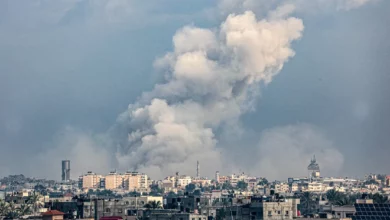Egypt's official position remains ambiguous with regard to the Palestinians' diplomatic quest to become the United Nations' 194th member.
President of the Palestinian Authority (PA) Mahmoud Abbas is expected Friday to submit a request to UN Secretary General Ban Ki-moon to begin the procedure to admit Palestine to the UN as an independent member state.
According to UN regulations, the secretary general has to submit the request to the Security Council for its 15 members to vote on. The Security Council includes five permanent members that have the power to veto any of the council's resolutions, including the United States.
During a meeting Thursday with Abbas on the sidelines of the 66th UN General Assembly meeting in New York City, US President Barack Obama expressed his rejection of the PA effort.
Although Egyptian Ambassador to the UN Maged Abdel Fattah announced that Egypt fully supports Palestine's accession, the positions of domestic leaders such as head of the Supreme Council of the Armed Forces (SCAF) Field Marshal Hussein Tantawi and Prime Minister Essam Sharaf remain vague, as none of them have issued statements on the issue.
"It is difficult for Egypt to adopt political positions during the transitional phase, especially since Egyptian decision makers might prefer not to engage in a direct conflict with the US now," said Ashraf al-Sherif, a political science lecturer at the American University in Cairo.
Similarly, Iman Hamdy, a political scientist and expert on Egypt-Israel relations, said that Egyptian decision makers have taken into consideration the tensions that emerged between Egypt and the US and Israel after protesters stormed the Israeli Embassy in Cairo on 9 September.
The last few weeks have seen massive demonstrations outside the Israeli Embassy to demand the expulsion of the Israeli ambassador and the cancellation of the Camp David Accords, which were signed between the two countries in 1979. The immediate cause for the protests was Israel's accidental killing of six Egyptian military and security officers on 18 August. Israeli soldiers were chasing militants that were fleeing the country after having crossed from Sinai and killing nine Israelis near the southern city of Eilat.
The Israeli government has not officially apologized to Egypt and strongly protested the storming of its embassy in Cairo.
Israeli officials have expressed alarm at Sharaf recently calling the Camp David Accords "non-sacred" and saying they should modified at the earliest opportunity.
For some observers, Egypt's silence might be symptomatic of its unease at Abbas' quest, which could compromise Egypt's historic position as a peace broker between the PA and Israel.
"The Egyptian position is very negative, because it does not provide any clear or practical propositions, being a permanent mediator in the peace process, especially considering that the stability of Palestine is part of Egyptian national security," said Tarek Fahmy, a political expert at the Middle East Studies Center, a government-funded research institution at Ohio State University in the US.
Fahmy said France has provided a more practical solution than Egypt or any other Arab country, proposing that Palestine should request to be an observer state in the General Assembly instead of trying to become a full member via the Security Council. If accepted as an observer state, Palestine can sue Israel before the International Court of Justice and the International Criminal Court for its continued occupation of Palestinian land.
Hamas, the political and military group that controls the Gaza Strip, has rejected Abbas' recent moves; the PA is highly controlled by Abbas' Fatah party. Hamas has accused its rival of attempting to re-draw the map of Palestine and tear it apart, as Abbas' bid is for a Palestine in the pre-1967 borders, not the borders before Israel was declared in 1948.
Egypt brokered a reconciliation deal between the two rival movements in April, which became more possible after former President Hosni Mubarak's fall considering his support for Fatah and animosity toward Hamas.
"I expect that Egypt is not going to adopt any position in favor of or against any of the Palestinian factions, especially since this is an international case in the first place," Sherif said.
Despite strong Egyptian public sympathy with the Palestinian cause, no major political groups have expressed a position toward the Palestinian UN bid, nor have any large street protests taken place either in either support or opposition. Observers attribute this to the heated and busy internal political scene in the country.
"It is understandable how the Egyptian street is preoccupied with its internal affairs," Sherif said. "Moreover, demonstrations organized by some political forces to protest the decisions of the [SCAF] do not seem to be paying off so far, and hence they expect the same with protests calling for a change in foreign policy."
The Islamist group Jama'a al-Islamiya is the only major Egyptian political organization to comment on the Palestinian bid, with press reports quoting its leader Tarek al-Zomor of accusing the US of spoiling the peace process in the Middle East and of giving unconditional support to Israel. The group is incensed at the US for not releasing its former leader, Omar Abdel Rahman, who was convicted for masterminding the bombings of the World Trade Center in New York City in 1993.




